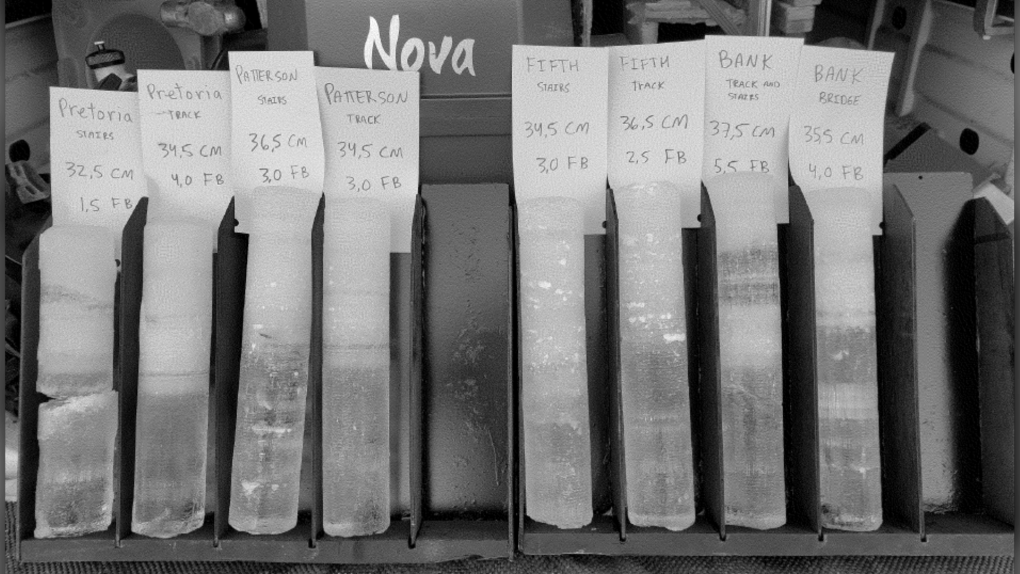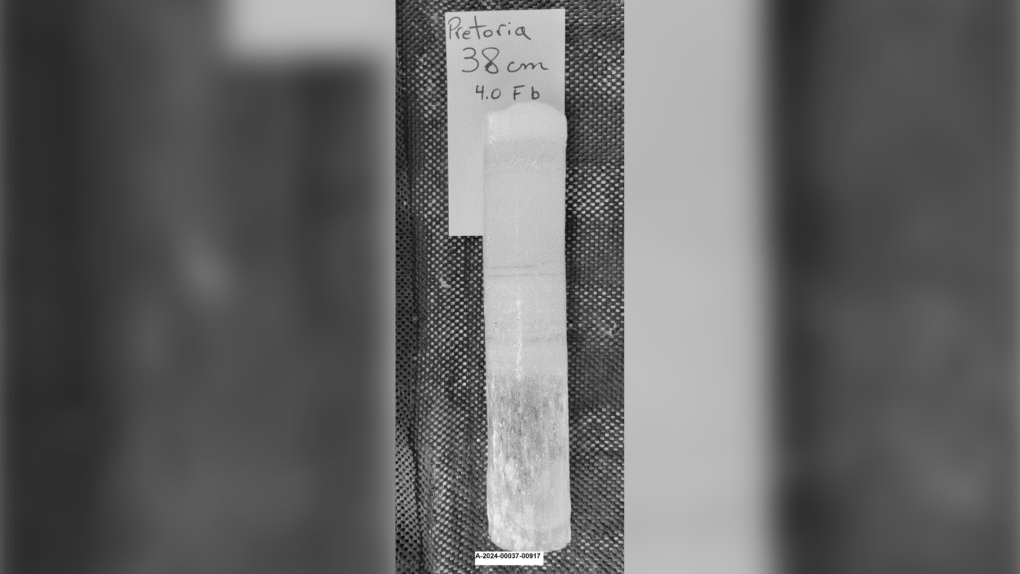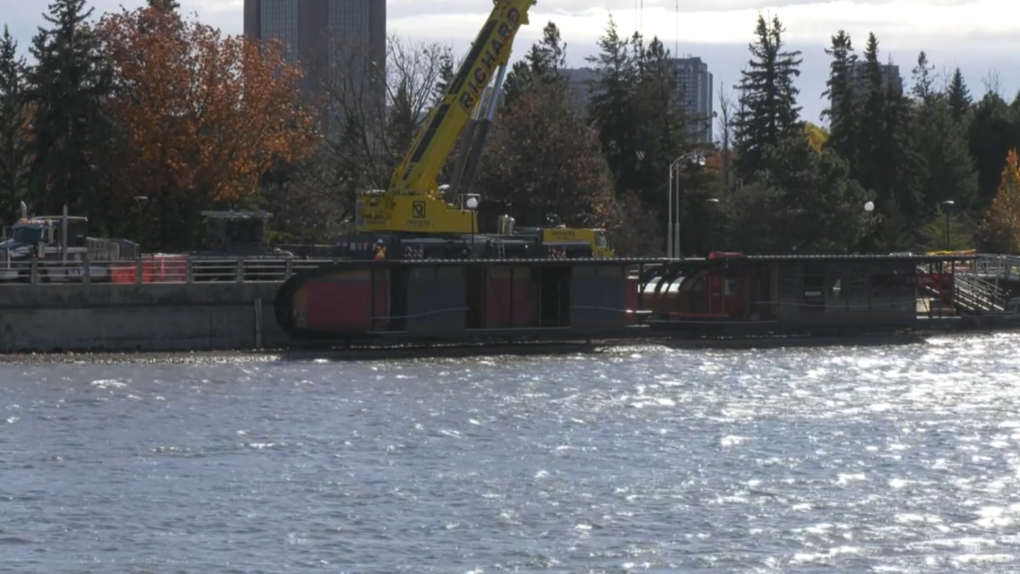NCC lowered ice thickness standard to push Rideau Canal Skateway open in February
As another winter approaches, eyes will be on the Rideau Canal with hope that skaters will have a better season on the world's largest skating rink.
The 2023-2024 skating season had just 10 skating days between Jan. 21 and Feb. 25 and was never open for more than four days at a time. It was the second-shortest season on record, behind the 2022-23 season when the Skateway did not open at all.
Internal documents show the National Capital Commission (NCC) struggled to maintain the ice on the Rideau Canal Skateway last winter and took what it called a "manageable risk" to lower their standards for what qualifies as thick enough ice in order to squeeze a few more skating days into the season.
CTV News Ottawa obtained more than 1,000 pages of internal documents, emails, and photographs through an access to information request that detailed the challenges that the NCC had with ensuring the ice was thick enough and safe enough to open the Rideau Canal Skateway in 2024.
Mild weather was largely to blame for the weak ice. Documents show there were several days where the ice was thicker than the recommended thickness, but the quality of the ice was so poor that it was effectively considered to be around 25 per cent thinner.
As the winter wore on, the NCC lowered its usual ice thickness criteria in order to open part of the canal near the end of Winterlude.
On Feb. 16, officials at the NCC proposed a 10 per cent reduction in the required ice thickness as a "manageable risk" to be able to open the canal again to skaters, with measures put in place to keep crowds dispersed and heavy vehicles off the surface.
"With the information provided on the lack of organized activities, that no vehicles and equipment will circulate on the ice and that measures will be put in place to disperse crowds, we deduced that a manageable risk would be to reduce the ice thickness by 10% to 27 cm, including white ice at 50% of its thickness, and that a freeboard of 8% min. would be acceptable in these measures," an internal email said.
"This is an exception to accommodate a partial opening with reduced programming and special measures as transmitted to us and is not the new standard of the Ice Safety Committee."
Ice samples taken the day before showed total ice thicknesses of between 32.5 cm and 37.5 cm, but white ice, considered to be half its total thickness, pushed the effective thickness threshold below 30 cm.
 A photo of ice samples taken from the Rideau Canal Skateway on Feb. 15, 2024, released under an access to information request.
A photo of ice samples taken from the Rideau Canal Skateway on Feb. 15, 2024, released under an access to information request.
"The objective was to invite people to benefit as much as possible from this unique attraction," said Bruce Devine. senior manager of Facilities and Programs at the NCC in an interview with CTV News Ottawa.
He added that a lower amount of snow on the ice surface meant that crews didn't need heavier vehicles to clear and prepare the surface for the public.
"We didn't need the big tractors. Our staff didn't use our pickup trucks. We used ATVs."
Devine said the ice was strong enough to support visitors safely.
A sample taken at the Pretoria stairs on Feb. 18 had a total thickness of 38 cm, but included 22 cm of white ice, which is effectively considered 11 cm. Combined with 16 cm of clear ice, it was an effective thickness of 27 cm.
 A photo of an ice sample taken from near the Pretoria stairs on Feb. 18, 2024, released under an access to information request.
A photo of an ice sample taken from near the Pretoria stairs on Feb. 18, 2024, released under an access to information request.
Devine says thickness is only part of the calculation when the NCC determines whether it's safe to open the Skateway.
"The 30 centimetres of thickness is a rule of thumb for icemakers," he said.
White ice, which is largely found toward the surface, is just as strong and supportive as clear ice if it's compacted and has few air bubbles, Devine said. The issue is it melts more quickly and therefore makes for a poorer ice surface for skating.
In fact, when the Skateway opened for part of the day Feb. 18, the NCC recommended visitors leave the skates at home.
"While the ice is thick enough to make it safe to be on the Skateway when we open at noon, the ice is in very poor condition, so we recommend walking over skating," the NCC said at the time.
The Skateway closed just hours later because of snowy weather and reopened at noon the following day.
Internal emails show the NCC was confident in opening to customers.
"The Ice Safety Committee feels comfortable recommending the partial opening of the Rideau Canal Skateway from the Pretoria stairway (km 2.1) to Bank (km 4.4)," an email dated 11:33 a.m. Feb. 19 said. "All ice samples taken at these locations meet the minimum criteria of 27 cm as indicated in the recommendation sent Friday, February 16."
Devine said the decision about the ice thickness threshold is something the NCC could consider in the future, in cases where poor weather causes issues for the Skateway.
"As long as the ice quality is there," he said.
The note from Feb. 16 recommended against going any thinner than 27 cm, with an ice freeboard of less than 8 per cent. Freeboard is the thickness of ice protruding above the water level. The NCC typically sets the freeboard threshold at 10 per cent.
Contractors who work on the ice surface had expressed some concerns in mid-February about the quality of the ice on the Skateway. NCC CEO Tobi Nussbaum assured contractors the NCC would accept full responsibility for its decision to allow people back on the ice.
"The NCC has the exclusive authority regarding the decision to open, or to close, the Skateway," Nussbaum wrote in an email dated Feb 15. "In accordance with these provisions, the NCC accepts that a decision to open the canal on Saturday, February 17th, will be at the sole responsibility of the NCC conditional on our assessment of the ice conditions."
Looking ahead
Devine said the NCC is hoping for better skating conditions this winter.
Environment Canada's senior weather climatologist said earlier this month that Ottawa will see "more of a winter than last year," adding that it's a "safe bet" it will be colder this winter compared to last year.
"That's encouraging," Devine said.
He said the NCC will continue to work with Carleton University this season and its "Snobot" to find ways to clear the ice of any fresh snow more quickly. The NCC has also acquired new weather sensors.
"This will give us real-time temperature readings for our ice making teams," Devine said.
Preparations for the 55th Rideau Canal Skateway season are getting underway, with stairs, ramps and changing huts being installed.
 Huts being installed on the Rideau Canal. Nov. 1, 2024. (Natalie van Rooy/CTV News Ottawa)
Huts being installed on the Rideau Canal. Nov. 1, 2024. (Natalie van Rooy/CTV News Ottawa)
Residents tell CTV News Ottawa they're hoping for more time on the ice this winter, even if the NCC has to lower its standards again.
"I would suspect it’s going to be perfectly safe, 10 per cent off. They were very cautious before and 10 per cent isn't too much. I think everybody would get out a few more times and that would be good," said Laurie Hill.
"I think it’s great; I think if they’ve done the work to find out if that’s appropriate and then we can trust them and it would be awesome to see it open more frequently," said Haley Adams. "I think it’s important that we want to adapt to climate change, to bring tourism into Ottawa."
"We don't know how things are going to transpire, look at our fall, it's been wonderful and warm, said Karen Hunter.
--With files from CTV News Ottawa's Natalie van Rooy
CTVNews.ca Top Stories

Trump suggests the U.S. should take back the Panama Canal. Could they do that?
Donald Trump suggested Sunday that his new administration could try to regain control of the Panama Canal that the United States 'foolishly' ceded to its Central American ally, contending that shippers are charged 'ridiculous' fees to pass through the vital transportation channel linking the Atlantic and Pacific Oceans.
Man handed 5th distracted driving charge for using cell phone on Hwy. 417 in Ottawa
An Ottawa driver was charged for using a cell phone behind the wheel on Sunday, the fifth time he has faced distracted driving charges.
Wrongfully convicted N.B. man has mixed feelings since exoneration
Robert Mailman, 76, was exonerated on Jan. 4 of a 1983 murder for which he and his friend Walter Gillespie served lengthy prison terms.
What's open and closed over the holidays in Canada
As Canadians take time off to celebrate the holidays, many federal offices, stores and businesses will be closed across the country on Christmas Day and New Year's Day.
opinion Christmas movies for people who don't like Christmas movies
The holidays can bring up a whole gamut of emotions, not just love and goodwill. So CTV film critic Richard Crouse offers up a list of Christmas movies for people who might not enjoy traditional Christmas movies.
Can the Governor General do what Pierre Poilievre is asking? This expert says no
A historically difficult week for Prime Minister Justin Trudeau and his Liberal government ended with a renewed push from Conservative Leader Pierre Poilievre to topple this government – this time in the form a letter to the Governor General.
More than 7,000 Jeep SUVs recalled in Canada over camera display concern
A software issue potentially affecting the rearview camera display in select Jeep Wagoneer and Grand Cherokee models has prompted a recall of more than 7,000 vehicles.
'I'm still thinking pinch me': lost puppy reunited with family after five years
After almost five years of searching and never giving up hope, the Tuffin family received the best Christmas gift they could have hoped for: being reunited with their long-lost puppy.
10 hospitalized after carbon monoxide poisoning in Ottawa's east end
The Ottawa Police Service says ten people were taken to hospital, with one of them in life-threatening condition, after being exposed to carbon monoxide in the neighbourhood of Vanier on Sunday morning.


































